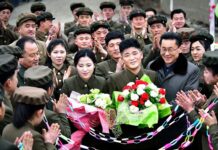Since the start of the new year, the city of Nampo appears to be using its commercial department and tax offices to tighten up tax collection with a view to boost tax revenue, Daily NK has learned.
Speaking on condition of anonymity, a Daily NK source in North Korea said Monday that the people’s committee of Nampo issued an order on Jan. 1 calling for “all-out efforts to simultaneously restore the state’s unitary control in the commercial sector and strengthen the role of tax offices.”
It also sent detailed instructions on how to do this to the city’s commercial department, the source said.
According to him, the Cabinet has called for boosting tax revenue as much as possible this year as taxes are the source of not only the national budget, but also the budgets of North Korea’s provinces and provincial level cities.
The people’s committee of Nampo responded to the order by instructing its commercial department and tax offices to launch efforts to survey, investigate and register new sources of tax revenue from the start of the year, issuing detailed guidelines for the offices to follow.
The source said Nampo is running an especially tight ship this year because it failed to deliver its national tax quota last year.
The source said Nampo’s commercial department is pressing marketplaces, procurement shops, stores for industrial goods and foodstuffs, general stores and other state commercial agencies to pay more in real estate fees to make up for last year’s deficits.
Tax offices, meanwhile, will inform households by Feb. 10 that they have more than tripled land and housing use fees compared to last year.
The source said that last year, residents of row houses, apartments and single-story homes paid 3% of their household income every month for housing use fees, which includes land use fees. Meanwhile, residents of detached homes paid separate housing and land use fees, with the latter set at KWP 100 per pyeong, a unit of measurement which roughly equals 35 square feet.
“Now, however, these residents must pay tax officers 3.5 times that much,” he said.
TAX OFFICERS TO REMEASURE LAND TO READJUST USE FEES
Moreover, Nampo will both measure and then include use fees for private gardens located in front of apartments or single-story homes into the household fees.
North Korea’s government receives quarterly real estate use fees from commercial entities for using government-owned buildings, and receives housing and land use fees from private individuals in return for providing homes. By collecting fees for the use of real estate, North Korea’s government is essentially levying a real estate tax.
In fact, tax officers are remeasuring the area of land used by detached homes in Nampo, explaining that the measure aims to “accurately measure the land and inform people of accurate use fees because this land, too, is the state’s property.”
The people’s committee of Nampo called on people to remember that North Korea “is a socialist country where everything is the property of the state and nothing is privately owned,” imploring them to realize that “it’s their duty as citizens to pay fees if they are using something.”
However, locals are reportedly whispering amongst themselves that tax agents — ignoring the separation between private and public money — must have made off with so much money last year that the people’s committee felt the need to force tax agents to submit itemized statements for use fees as a way to prevent corruption.
The city’s commercial department and tax offices are also looking for completely new sources of tax revenue, the source further reported.
He said the authorities have begun surveying and registering new sources of tax income by investigating the activities of people engaged in a wide range of commercial businesses, including selling homemade alcohol, candies or knitwear.
Translated by David Black. Edited by Robert Lauler.
Please direct any comments or questions about this article to dailynkenglish@uni-media.net.



















